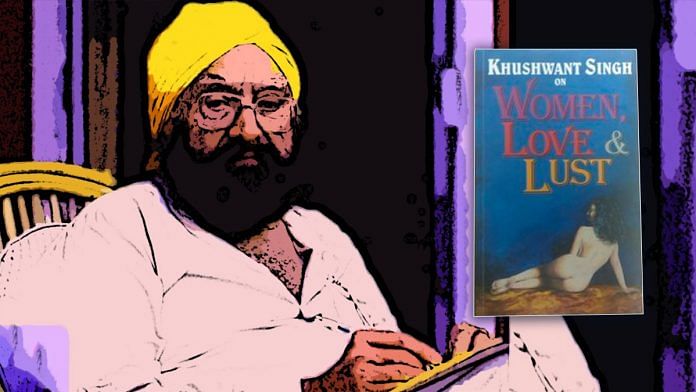New Delhi: Khushwant Singh’s book Women, Sex, Love and Lust, is belatedly facing objection for its ‘obscenity’.
On a visit to Bhopal railway station, Ramesh Chandra Ratn — chairman of the Railway Board’s Passenger Service Committee (PSC) — asked a vendor to stop selling Singh’s novel, saying such literature may spoil the future generation and that “it is offending to our sisters and daughters”. He added that if such books are sold at stations, a fine would be imposed.
Women, Sex, Love and Lust, published in 2011 by Hay House, is a compilation of articles and essays Singh wrote for several magazines over time, about Indian women, sex from Chaturbhani (200-350 B.C.), celibacy, chastity and arranged marriages.
The anthology is divided into three sections — women, sex and love and lust. The first section deals with topics such as the Indian woman, female porn and verbal sexual harassment. Next up are essays on sex and marriage, celibacy and chastity, whoring and the law. Finally, in the last section, Singh attempts to answer the eternal questions on love and lust and other such things.
In the book’s introduction, Singh writes, “My books may not sell like proverbial hot cakes, but they do cater to the taste of those who like to read spicy hot stuff like they relish bhel-puri on the sands of Chowpatty beach.”
The second essay in the anthology, for example, addresses the treatment of women as inferior to men. Singh points out that even literary giants such as Leo Tolstoy and William Shakespeare had a low opinion of women. Elaborating on the many proverbs from across the world that feed into this gender disparity, Singh ends the essay with a 17th-century English proverb that succinctly summarised the chapter, “Men have many faults, women only have two. Everything they say and everything they do.”
Analysing the Indian woman, Singh coined the term ‘Shrimati India’ — “In work an ayah, in kitchen a cook, in business a bania, in bed a courtesan. If you have them all in one person, you do not have to be polygamous — you have a one-woman harem.”
While Singh’s other works fall in a similar category of sex and women told in a risqué way — some of which include Black Jasmine and Other Stories and The Company of Women — they have never been banned. Popularly known to be rakish and bawdy, the prolific writer’s novel Train To Pakistan remains a seminal work on Partition. He has received many awards, including a Padma Bhushan in 1974 (which he returned 10 years later to protest against Operation Bluestar), and a Padma Vibhushan in 2007.
Also read: Amartya Sen & Jean Drèze are Left heroes but it would be wrong to call them simple statists



